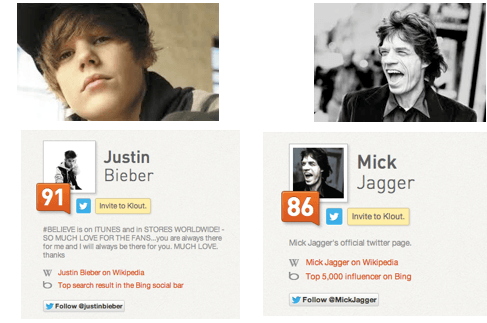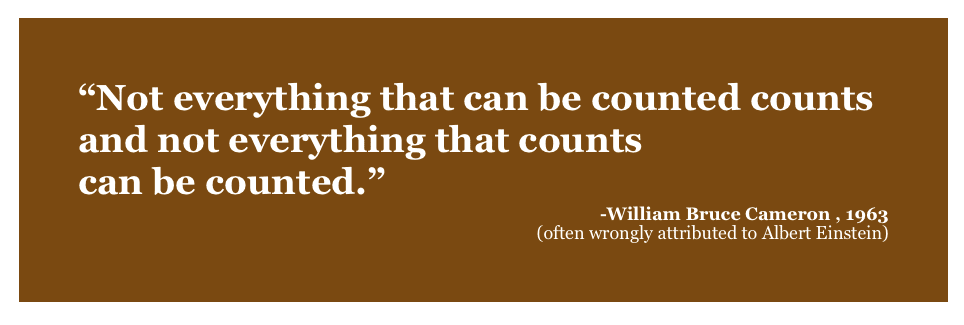To use or not to use?
You know it’s a sad day when 18-year old Justin Bieber (91/100) is said to have more influence than Mick Jagger (whose stones are gathering no moss, as they have just announced two more shows both in London and in New York cf Rolling Stone)!
But, as controversial as influence measurement systems such as Klout, Kred or PeerIndex are, I maintain that they are still a valid and valuable tool for business. All the same, the question for me is not whether or not to use them; the question is how best to use them.
Why influence measurement counts
Here’s my take on why influence measurement counts.
 In the absence of an alternative, they are the next best thing available. To the extent brands need to allocate their scarce resources as efficiently as possible, the scoring system is likely as good a way as exists to make targeted communications and digital marketing campaigns (ie. for PR or CRM), or to recognize a possible amplifier for Customer Service.
In the absence of an alternative, they are the next best thing available. To the extent brands need to allocate their scarce resources as efficiently as possible, the scoring system is likely as good a way as exists to make targeted communications and digital marketing campaigns (ie. for PR or CRM), or to recognize a possible amplifier for Customer Service.- They are not perfect, but they at least provide a rational way to discuss the topic with the hierarchy who would prefer to talk numbers than loosy-goosy ideas such as “emotion” and “engagement” (which remain essential).
- Beyond the single figure score, the deeper information (such as who you influence, your influencers, your communities or topics of influence. etc…) may be more revealing. Over time, the trend in the numbers will also provide insights.
- These measurement systems will improve over time if they can figure out their economic model, have enough support and we, too, learn how to use them better.
- The last reason is more of an insight how I believe these systems will evolve. First, they will inevitably want to become communities in their own right. Secondly and more prospectively, I believe they could end up very useful as being the repository of all one’s social media identities. Just think of it: each social media to which you belong you probably have a different username, varying email addresses and, of course, different complex passwords, no? In the future, is it not possible that a service like Klout could end up being your gateway into all your social media sites?
The cons must be aired
Sure, there are some downsides to these services. Tantamount among the cons are:
- people will inevitably game the numbers
- the numbers are essentially only online and, for now, predominantly weighted for Twitter (more or less open API, etc)
- the strength of those influence numbers relies on the credibility of the organization behind them
- how transparent are they with the scoring?
- how trustworthy are they with your data?
- the companies running these systems may change the rules at will, or more drastically evaporate for not having found an economic model.
How to best to use influence scoring systems
In terms of best ways to use these influence measurement systems, here are what I consider a few guidelines.
- First, spend some time scoping out the systems.
- I suggest using at least two systems in parallel (e.g. Klout and Kred) to evaluate which ones work best for your business and customer base.
- Score your own brand. Find out where the system places you — it’s as starting point to indicate your digital influence.
- Test out the “perks” for your brand on a small trial basis.
- Engage with people with higher scores versus lower scores with the same energy and see if the amplification is legitimate.
- Try out some “exclusive” events with the higher ranking people and, using a value against each output, evaluate the ROI. What is the best cut off level? Is your customer base sensitive to such an approach?
- Try, Fail, Learn and Try again!
Bottom line about Influence
You cannot rely solely on these tools. Knowledge of your customer base (i.e. being customer centric), strong values and having some higher mission, and, above all, irreprochable product/service are the best ways to gain good and lasting word of mouth. But, in the absence on other tools, I would recommend getting used to these measurement systems, as I believe that they have a good future, providing they remain transparent and find a suitable economic model that doesn’t push them to be too unfriendly.
So, what’s your take? Are you a believer or would you prefer to live Kred and Klout-free?
For further reading, you might enjoy listening to this podcast interview I cut with the CEO of Kred, Andrew Grill.














Hello there! I could have sworn I’ve been to this blog before but after looking at many of the posts I realized it’s new to me.
Anyways, I’m definitely delighted I discovered it and I’ll be
bookmarking it and checking back frequently!
Hello there! I could have sworn I’ve been to this blog before but after looking at many of the posts I realized it’s new to me.
Anyways, I’m definitely delighted I discovered it and I’ll be
bookmarking it and checking back frequently!
Incredible! This blog looks just like my old one!
It’s on a entirely different topic but it has pretty much the same page layout and design.
Excellent choice of colors!
Incredible! This blog looks just like my old one!
It’s on a entirely different topic but it has pretty much the same page layout and design.
Excellent choice of colors!
Greetings! Very helpful advice within this post! It is the little changes that will make the most significant changes.
Thanks for sharing!
Greetings! Very helpful advice within this post! It is the little changes that will make the most significant changes.
Thanks for sharing!
I really like your blog.. very nice colors & theme.
Did you make this website yourself or did you hire someone
to do it for you? Plz answer back as I’m looking to design my
own blog and would like to know where u got this from.
many thanks
I really like your blog.. very nice colors & theme.
Did you make this website yourself or did you hire someone
to do it for you? Plz answer back as I’m looking to design my
own blog and would like to know where u got this from.
many thanks
Hi would you mind letting me know which webhost you’re working with?
I’ve loaded your blog in 3 completely different internet
browsers and I must say this blog loads a lot faster then most.
Can you recommend a good internet hosting provider at a fair price?
Thank you, I appreciate it!
Hi would you mind letting me know which webhost you’re working with?
I’ve loaded your blog in 3 completely different internet
browsers and I must say this blog loads a lot faster then most.
Can you recommend a good internet hosting provider at a fair price?
Thank you, I appreciate it!
Great post. I was checking constantly this blog and I’m inspired!
Extremely helpful information specially the closing phase :
) I handle such information much. I was looking for this
certain information for a long time. Thanks and good luck.
Great post. I was checking constantly this blog and I’m inspired!
Extremely helpful information specially the closing phase :
) I handle such information much. I was looking for this
certain information for a long time. Thanks and good luck.
I am sure this piece of writing has touched all the internet people,
its really really nice piece of writing on building up new webpage.
I am sure this piece of writing has touched all the internet people,
its really really nice piece of writing on building up new webpage.
Bangalore to Pune Bypass location might be accessed from the project site within couple of minutes of
comfy drive. And wherever the manufacturer exists,
there we shall find his work which is featured inside town’s Henry Ford Museum that focuses on innovations through the entire years.
The Great Harbour consists with plenty of bays and quays and fortifications.